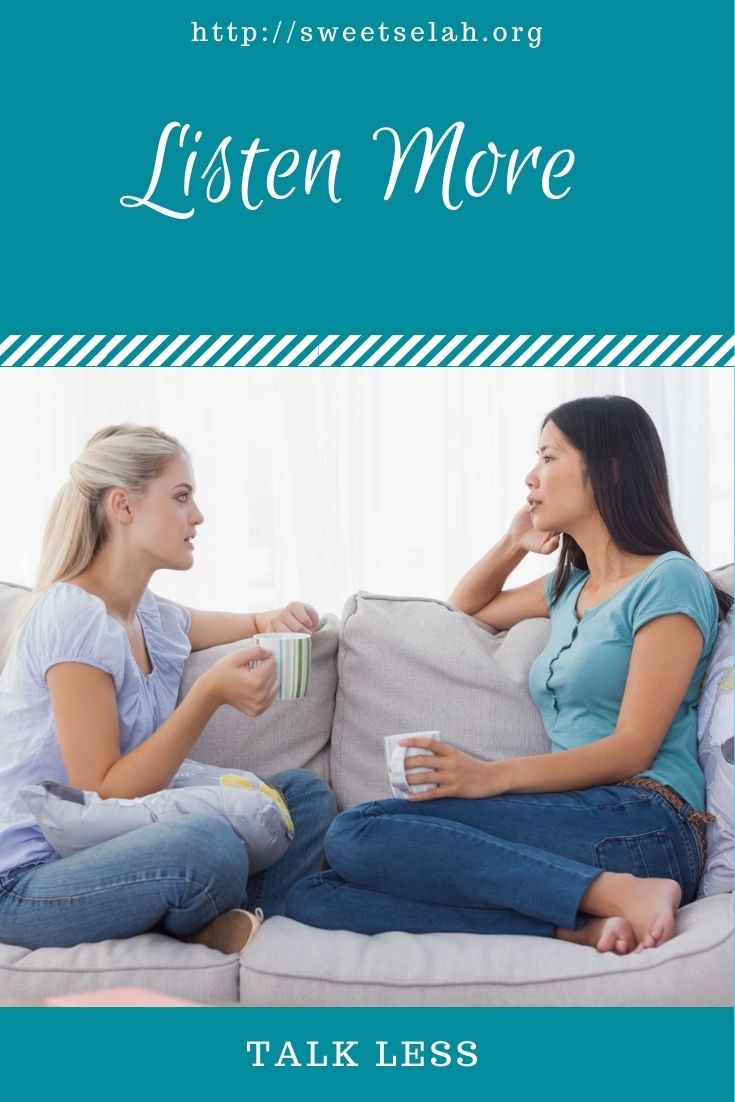
Understand this, my dear brothers and sisters: You must all be quick to listen, slow to speak, and slow to get angry. —James 1:19 NLT
I love to talk. And I’m quite good at it. I can share every little minute detail about various events in my life until even my closest friends wish I’d change the subject or just “shush!” Thankfully, I have improved in this area quite a bit over the years. Had I not, I suspect I would have far fewer friends! This, I realize, is not everyone’s problem. However, whether you have to work on this a lot or a little, let me assure you: If you really want to be heard … say less. Here’s what happens when you listen more and speak less, as James so wisely advises in our verse above:
- You discover that listening instead of talking teaches you so much more about another human. Listening well is an art. Too often we listen with only half our minds while the other half is busily creating a reply. When we learn to listen with a “teach me” attitude, a whole lot can be discovered about others that we would have totally missed. Let’s value those we love enough to listen and ask questions. It’s a great way to show you love them and care about what they think and what they believe and who they are.
- You find that many misunderstandings go away. By asking a few questions instead of jumping to conclusions, we often gain a totally fresh perspective on what someone meant by their initial words. I cannot tell you how many times this has helped me with my husband, Ray. He tends to use words quite infrequently and does not always “soften” them up with niceties. So, I can be left feeling hurt when that was far from his intention. Asking a key question or two instead of jumping to a wrong conclusion has improved our communication dramatically. This is not just for marriage, though. When you’re talking about a hot-button topic with someone and you disagree, you will learn so much more if you ask questions and probe more deeply instead of attacking them based on quickly-formed assumptions. Let’s work at being hard to offend, seeking instead to understand others—first by listening well and then keeping our words few and kind.
- You start to realize that too many words blur your message and make it harder for your listener to digest what you have said. It’s very hard to listen for long periods of time without losing your focus. I’ve found that if I think through what I’m going to say first and say it once—clearly, that has much more impact than when it is surrounded by a cluster of extra words. When we explain and re-explain at great length, it can be downright offensive to the listener. It makes them feel as if you think they’re unable to understand simple English. With family members, if you go on and on and on, you’ll find they tune you out rather quickly. They’ve been there, done that, and heard you drone on and on before. [Sigh.] It’s better and more effective to say less and then be still.
If you really want to hear … listen more and talk less.
If you really want to be heard … listen more and talk less.
Father God, thank You for the very practical nature of Your Word. You help us in so many ways when we go to Your Word and put into practice what You teach. Help us to listen more and talk less in the year ahead, please. Perhaps especially, Lord, when we meet with You! In Jesus’ Name, Amen.

You are loved,
Sharon
Sweet Selah Ministries
Vision
To inspire a movement away from the belief that “busy is better”
and toward the truth of God’s Word that stillness and knowing
Him matter most—and will be reflected in more effective work and service
Mission
To offer biblical resources and retreats that help women pause (Selah)
and love God more deeply as they know Him more intimately (Sweet)
Donate
If you’ve been blessed, keep the blessing going!
Click over to our Donation page … and thanks.
Share it. Pin it.



